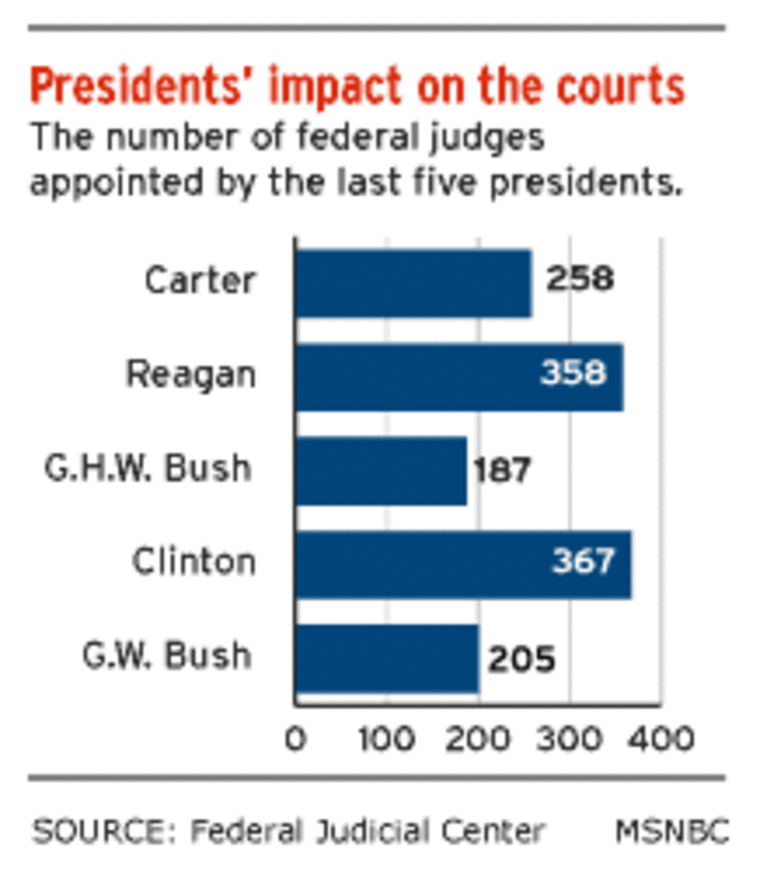The seemingly inevitable is creeping closer: Soon, the Senate may vote on a proposal by Majority Leader Bill Frist to lower the requirement for ending filibusters of judicial nominees from 60 to 51.
Senate Minority Leader Harry Reid has threatened to bring all non-essential Senate business to a halt if Frist changes the filibuster requirement.
Democrats make the argument that they have filibustered 10 Bush appeals court nominees and have allowed 34 to be confirmed. They have also allowed 171 district court judges to be confirmed.
Appeals court judges are the ones at stake since it is they who make far-reaching constitutional rulings, many of which never make it to the Supreme Court docket.
High stakes for ordinary citizens
The duel over judges is not merely a featured event on the inside-the-Beltway version of the Extreme Sports Channel. Democrats and Republicans have genuine ideological differences over who should fill seats on the bench.
Whether the judges are Bush judges or Democratic-selected ones, they will set the rules for an American’s personal and business life: everything from how the Endangered Species Act restricts her use of her land, to whether her kids will say prayers in the public school they attend.
A Bush-appointed judge such as Jeffrey Sutton, age 43 when confirmed to the appeals court, will be making such rulings perhaps until 2040.
In a possible indication that the week of April 25 may be the one he has chosen for the filibuster showdown, Frist has scheduled an appearance at an April 24 "Justice Sunday" television broadcast sponsored by the social conservative group Family Research Council.
The event, according to FRC, is designed "to engage values voters in the all-important issue of reining in our out-of-control courts." The group said the filibuster of judicial nominees is "being used against people of faith."
Reid summoned reporters to his office Friday and denounced Frist's plan to take part in the FRC event. The allegation that Democrats had used the filibuster against religious people "is really too much," Reid said.
"They are insisting now that judicial nominees meet a religious test," said Democratic Whip Sen. Dick Durbin of Illinois. He said in questioning judicial nominees, "We can not and will not ask a person who is a nominee what his faith might be or whether he has one. So it is not a matter of faith. From what I gather, they are arguing that we should only bring forward nominees who have beliefs that are consistent with their religious beliefs. That, to me, is troubling and clearly unconstitutional."
Under the Constitution, the House has no role in confirming judicial nominees, but House Majority Leader Tom DeLay has handed Democrats ammunition by threatening judges.
He apologized Wednesday for warning after Terri Schiavo’s death that the judges who didn’t intervene to keep her alive would need “to answer for their behavior.”
But DeLay did not retreat from his reminder that the Constitution gives Congress the power to restrict federal courts’ jurisdiction.
DeLay’s comments, as well as those of conservatives outside Congress supporting the impeachment of judges, have convinced Democrats that they now have the upper hand in the battle for Americans’ hearts and minds.
Student assails Scalia
The rhetoric on both sides has reached new heights or, perhaps more accurately, sunken to new depths. When Justice Antonin Scalia made a speech at New York University Law School this week, Eric Berndt, a law student, challenged Scalia's dissent in the Supreme Court's 2003 Lawrence v. Texas decision that declared sodomy was constitutionally protected.
"Do you sodomize your wife?" Berndt asked Scalia.

The showdown on judges seems inevitable because conservatives have concluded that judges often invent extra-constitutional rulings and defy the will of Congress and the people.
"Are they the rulers in America? That’s what I get asked by people," said Sen. Sam Brownback, R- Kansas. “Particularly when judges deal with such fundamental social issues that go counter (to the people), these are issues the country ought to engage. You’ve got marriage and (judges) going counter to the whole country, so is there nobody that can push back against the courts?”
What Republicans may need at this point to mobilize public opinion to their side is a new court ruling that might convince people that judges are acting egregiously: something along the lines of the Ninth Circuit's decision 2002 striking the words "under God" from the Pledge of Allegiance or the Supreme Court's 2003 Lawrence v. Texas sodomy decision.
The filibuster struggle is a test of leadership not only for Reid and for Frist, who has presidential ambitions, but for Bush and Karl Rove as well. What good is it for Bush to have won last November’s election, Republicans might well ask, if the fruits of that victory are denied?
Uncertain vote count
Three Republican senators, Lincoln Chafee of Rhode Island, Olympia Snowe of Maine, and John McCain of Arizona, have said they would vote “no” on the Frist filibuster proposal. A few other Republicans, such as New Hampshire’s John Sununu and Judiciary Committee chairman Arlen Specter of Pennsylvania, haven’t yet publicly committed themselves.
Frist felt compelled to acknowledge this week that he’d lost the battlefield initiative to his adversaries.
“All of you are covering what they (the Democrats) are saying, while I am simply trying to work across the aisle. Our voice is being lost,” he told reporters, in a somewhat plaintive admission.
A leading Democratic filibuster advocate, Sen. Charles Schumer of New York, could not help but gloat Thursday.
"What’s amazingly gratifying is that, in poll after poll, the public understands that the ‘nuclear option’ is an over-reach… and that the right to filibuster judges should be kept," Schumer said. "The public has this sense that there’s extremism in the air. The debate seems to be going in our direction far more quickly than I ever imagined."
Specter seeking a way out
Meanwhile, in the hope that reasonable senators might find a way out of the confrontation, Specter was still gamely trying this week to persuade his Democratic colleagues to not filibuster. Specter contended that last year's filibuster victims (notably William Pryor, Priscilla Owen, and Janice Rogers Brown) are really not ideological cranks and he supplied evidence of their judicial rulings to make his case.
"I’ve circulated an analysis of Justice Owen’s record,” he told reporters Thursday. “She is broadly considered to be against Roe v. Wade (the 1973 abortion decision) because of decisions she handed down on judicial bypass. Careful analysis, which I’ve made of her 13 decisions shows that she respects Roe.”
“We’ve circulated Judge Pryor’s five opinions in support of the district judge in (the) Schiavo (case), so we’re working on it,” Specter said.
Republican strategists say that ultimately the filibuster campaign will focus on an appeal to the common-sense idea that the person with a majority of the votes, 51 out of 100, ought to win.
Democrats confidently make the contrary case that 51 out of 100 senators isn’t enough, that the new de facto requirement for judicial confirmations is 60, the number of votes needed to end a filibuster.
"If you appoint a lifetime judge who has huge powers, there ought to at least be a strong leaning that they have some bipartisan support, that they have broader support than just 51-49," Schumer said Thursday.
But Republicans think the political calculus favors them.
"It's very hard for Democrats to make the case for obstruction. It's not an appealing argument for voters," said Republican strategist Jonathan Baron.
Looking toward next year’s Senate elections, Baron said, "If I were a Democratic incumbent in a Republican-leaning state, I'd be a lot more worried about the arguments Republicans could make against me on this issue than if I were a Republican in a Democratic-leaning state."
